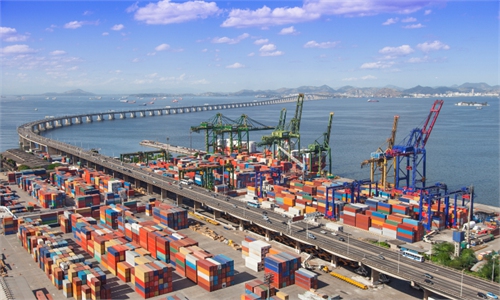Chinese firms kick off series of infrastructure projects in Brazil, offering examples for win-win co-op: expert

Photo: Screenshot of the official Wechat account of China Railway No. 10 Engineering Group Co
Some Chinese firms have successively announced or kicked off infrastructure projects in Brazil in recent months, with the latest example being China Railway No.10 Engineering Group Co on Monday holding a groundbreaking ceremony to start the construction of its first railway project in the Latin American country.
Brazilian President Luiz Inacio Lula da Silva and several other senior officials attended the ceremony in the Brazilian state of Bahia, the company said in a statement released on its website on Tuesday.
Lula congratulated the official commencement of the project and emphasized the significant importance of the FIOL Railway Project for Brazil's economic and social development in his speech.
Jeronimo Rodriguez, governor of the State of Bahia, said at the ceremony that the project will play a crucial role in further improving Brazil's national railway network, enhancing transportation connectivity between the eastern and western regions of the country, and promoting the development and rise of Bahia State.
The FIOL Railway Project is a freight railway with a total length of 537 kilometers. The Chinese firm will build the first section spanning 126 kilometers. Once completed, it will serve as a major artery for inland and coastal transportation in Brazil, significantly reducing the time and cost of transporting agricultural and mineral products from the inland to the eastern Atlantic ports.
It will promote the exports of bulk commodities, create thousands of jobs, and lead to an annual cargo transportation capacity of 60 million tons, according to the company statement.
The railway project vividly reflected the strategic importance of the cooperation between China and Brazil, Sun Yanfeng, director of Latin American research at the China Institutes of Contemporary International Relations, told the Global Times on Wednesday.
On one hand, it will establish a channel for transporting Brazil's resources to the ports; on the other hand, it could pave the way for the construction of the Central Bi-Oceanic railway - a mega 3,750-kilometer railway project running from the continent's western side all the way to the eastern side and linking the Pacific and Atlantic Oceans, Sun said.
It has also demonstrated great complementarities in the cooperation between China and Brazil, and sets examples for other Latin American countries in cooperating with China, experts said.
"Brazil has a huge demand in terms of infrastructure construction while China has been well-known for its advantages of technology, capital and talent in this field," Wang Youming, director of the Institute of Developing Countries at the China Institute of International Studies in Beijing, told the Global Times.
Before the kick-start of the railway construction, Chinese firms including PowerChina, China Energy Co, Brazilian branch of State Power Investment Corporation (SPIC) and others have announced new investments consecutively in the Latin American country over recent months, according to media reports.
PowerChina has completed the acquisition of stock rights of a 344-megawatt photovoltaic (PV) project in Mauriti, a city located in northeastern Brazil, according to a statement the company sent to the Global Times on Wednesday.
The construction of the project officially started on March 30, and is expected to be completed in 18 months and commercially connected to the grid on September 30, 2024, the company said.
After completion, the project will become PowerChina's largest overseas PV project, which has important strategic significance for the company in the global new-energy investment field, as well as the development of Brazil's new-energy market, the company stressed.
SPIC's local branch also announced a plan to add $2 billion in investment in Brazil. The total power generation of the company's two solar projects in the country is expected to increase from the current 2.5 gigawatts to 5 gigawatts in 2025, according to media reports.
Leading Chinese carmaker BYD also pledged to invest a cumulative 10 billion reais ($2.07 billion) in Brazil by 2025, and its businesses include solar energy in addition to the production and assembly of electric vehicles, reports said.
One other highlight of the bilateral cooperation is mutual benefit. When the projects are put into operation, they would rapidly generate income and bring tangible benefits to local residents, while they could also build up the reputation of Chinese companies around the global market, Sun said.
Not only the Chinese companies have been offering the most competitive products and services, but they also have strong commitment to environmental protection, proving that Western media accusations of China-built railways leading to "debt traps" or damaging the environment are groundless slander, Sun stressed.
The successive launch of the infrastructure and other projects has shown that "Latin American people just don't buy these rumors anymore," Wang said.



